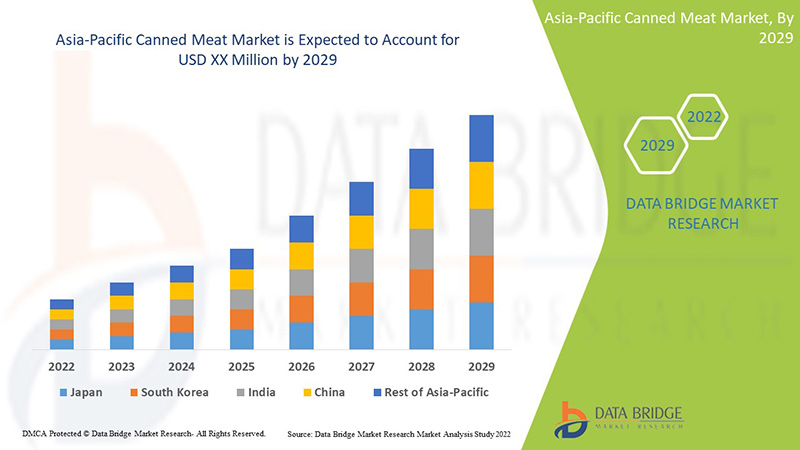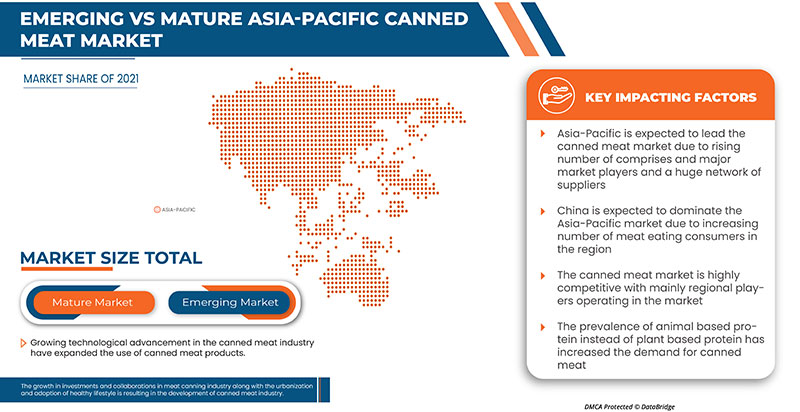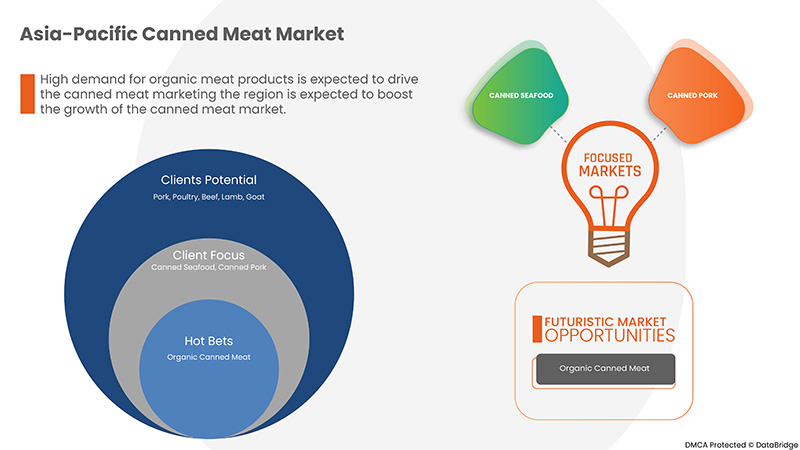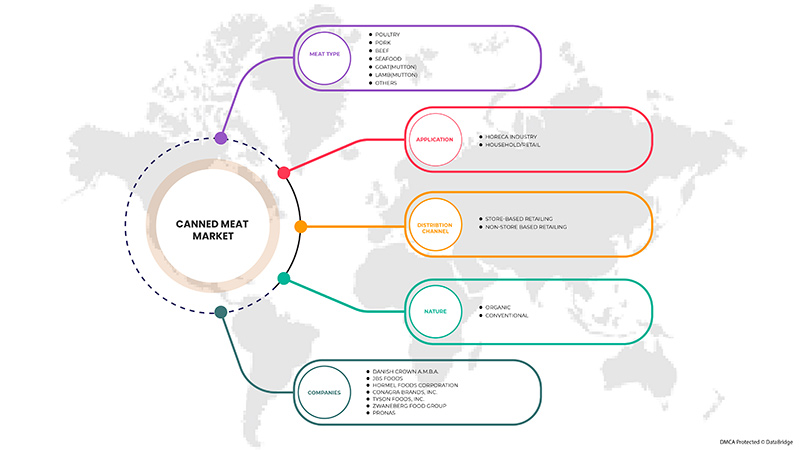Mercado de carne enlatada de Asia y el Pacífico, por tipo de carne (ave, cerdo, res, mariscos, cabra (cordero), cordero (cordero) y otros), naturaleza (orgánica y convencional), aplicación (industria Horeca y hogares/venta minorista), canal de distribución (venta minorista en tiendas y venta minorista fuera de tiendas/minoristas en línea): tendencias de la industria y pronóstico hasta 2029.

Análisis y perspectivas del mercado de carne enlatada de Asia y el Pacífico
Los productos cárnicos enlatados se elaboran sellando herméticamente (evitando que el aire escape o entre) el producto en un recipiente (generalmente latas de acero recubiertas de estaño) y procesándolo térmicamente para matar los microorganismos que lo deterioran. La carne enlatada es un alimento de alta calidad, rico en proteínas, que se mantiene estable a temperatura ambiente y es extremadamente conveniente. Los consumidores pueden elegir entre una amplia variedad de productos a base de carne. Los músculos enteros, los guisos de carne, los fiambres, las salchichas, las salsas con trozos de carne y los productos en pasta son ejemplos de productos cárnicos enlatados.


La mayoría de las carnes enlatadas se esterilizan "comercialmente", lo que significa que se han procesado para matar la mayoría de los microorganismos y sus esporas. Son de buena calidad y tienen el etiquetado adecuado. Sin embargo, se espera que los altos costos de inversión de la carne enlatada y sus productos limiten el crecimiento del mercado de la carne enlatada durante el período previsto.
Se espera que el aumento de la demanda de productos cárnicos orgánicos y la creciente conciencia de la salud entre la gente, junto con la urbanización, creen inmensas oportunidades para los fabricantes de carne enlatada. Por otro lado, la falta de normas uniformes de seguridad alimentaria puede suponer un desafío para el crecimiento del mercado.
Data Bridge Market Research analiza que el mercado de carne enlatada de Asia-Pacífico crecerá a una CAGR del 3,3% durante el período de pronóstico de 2022 a 2029.
|
Métrica del informe |
Detalles |
|
Período de pronóstico |
2022 a 2029 |
|
Año base |
2021 |
|
Años históricos |
2020 (Personalizable para 2019 - 2015) |
|
Unidades cuantitativas |
Ingresos en millones de USD, precios en USD |
|
Segmentos cubiertos |
Por tipo de carne (ave, cerdo, res, mariscos, cabra, cordero y otros), naturaleza (orgánica y convencional), aplicación (industria de hostelería y hogares/venta minorista), canal de distribución (venta minorista en tiendas y venta minorista fuera de tiendas/venta minorista en línea) |
|
Regiones cubiertas |
China, Japón, Vietnam, India, Indonesia, Corea del Sur, Filipinas, Australia, Malasia, Tailandia, Nueva Zelanda, Singapur y resto de Asia-Pacífico |
|
Actores del mercado cubiertos |
JBS Foods, Danish Crown AMBA, Oceans Secret, China Kuyu, Industrial Co. Ltd., Pronas, Beijing Yuanyoung Hongxing Food Co. Ltd., Conagra Brands, Inc., Zwanenberg Food Group |
Definición de mercado
La carne enlatada es un alimento de alta calidad, rico en proteínas, que se mantiene estable a temperatura ambiente y es sumamente conveniente. Los consumidores pueden elegir entre una amplia variedad de productos a base de carne. La carne es un alimento poco ácido que debe esterilizarse a menos que se tomen otras precauciones. La mayoría de los países tienen regulaciones alimentarias y de higiene específicas que rigen el sacrificio y el procesamiento de la carne, y estas y las de los organismos reguladores pertinentes deben cumplirse antes de producir cualquier producto cárnico.
Dinámica del mercado de carne enlatada en Asia y el Pacífico
Conductores
-
Crecimiento de inversiones y colaboraciones en el negocio de procesamiento y enlatado de carne
La creciente demanda de diferentes productos cárnicos conduce a un aumento de las inversiones y colaboraciones en el mercado de procesamiento y enlatado de carne. Muchos inversores tienen varios enfoques, como empresas conjuntas, adquisiciones, lanzamiento de nuevos productos y adquisiciones, entre otros. Para las inversiones en el mercado de enlatado de carne. Muchas empresas cárnicas optan por analizar desde una perspectiva de sostenibilidad, considerando el escenario futuro. Muchas empresas utilizan una variedad de indicadores de agua, clima y tierra para calcular sus huellas ambientales y de carbono para informar sus decisiones de inversión. Además, las empresas también se están asociando con varios institutos de investigación alimentaria para el desarrollo de productos en el mercado de enlatado de carne. Las empresas están invirtiendo en el mercado de la carne debido a la creciente popularidad de los productos cárnicos de fuentes de proteínas saludables. Además, ha habido una comprensión clave de los beneficios para la salud de varios productos cárnicos que surgen de las aves de corral, etc.
Como resultado, las empresas están continuamente adquiriendo, obteniendo financiación e invirtiendo en nuevos productos, lo que se espera que impulse el crecimiento del mercado.
-
Preferencia por las proteínas de origen animal frente a las de origen vegetal
La adopción de proteínas vegetales como alternativa a las proteínas de la carne ha aumentado las alergias entre algunos consumidores. Afecta de forma desproporcionada a los niños, lo que hace que los productos cárnicos aumenten en el período previsto.
Las alergias a los productos alimenticios veganos aumentan el riesgo de deficiencias nutricionales que pueden causar efectos graves en la salud de las personas. La tasa de alergia alimentaria mediada por inmunoglobulina E ha alcanzado su punto máximo, especialmente en los países de altos ingresos. La gran cantidad de macro y micronutrientes presentes en las legumbres, las legumbres secas y los cereales integrales, entre otros, es una de las principales razones que provocan alergias y efectos secundarios como hinchazón, náuseas y mala digestión. Debido al aumento de las alergias al consumo de carne de origen vegetal, los consumidores pueden tender a desviar su atención hacia los productos cárnicos convencionales debido a diversas alergias asociadas con el consumo de carne de origen vegetal. Esto está impulsando el crecimiento del mercado.
Oportunidades
Creciente preferencia por la carne orgánica
La agricultura ecológica no sólo ayuda a los pequeños agricultores a obtener un precio justo por sus productos, sino que también beneficia al medio ambiente al fomentar el cultivo de una gran variedad de alimentos naturales. Los alimentos ecológicos no contienen pesticidas ni fertilizantes químicos y se cultivan de forma natural con la ayuda de estiércol o compost. Los alimentos ecológicos no contienen hormonas de crecimiento ni residuos de antibióticos, por lo que no suponen una amenaza para el futuro de los niños.
Restricciones/Desafíos
- Altos costos de inversión en el negocio avícola
Los fabricantes de aves de corral se enfrentan a varias adversidades en términos de transporte, almacenamiento inadecuado y desperdicio de productos que conducen a la pérdida de valor de los productos finales.
Los equipos utilizados en el negocio avícola, como el procesamiento de alta presión, los equipos de refrigeración, los equipos de masaje y los inyectores, aumentan la eficiencia de la producción de alimentos al reducir el desperdicio.
Sin embargo, las unidades de procesamiento de aves requieren de grandes inversiones de capital en términos de requerimientos masivos de infraestructura, que incluyen plantas de empaque, instalaciones de almacenamiento en frío a lo largo de la cadena de valor, equipos de última tecnología para procesar carnes procesadas que mantengan sus valores nutricionales, infraestructura en los puertos con facilitación fitosanitaria y logística multimodal.
Impacto posterior al COVID-19 en el mercado de carne enlatada de Asia y el Pacífico
La COVID-19 ha afectado al mercado en cierta medida. Debido al confinamiento, se detuvo la fabricación y producción de muchas empresas pequeñas y grandes, y también aumentó la demanda de carne enlatada, lo que influyó en el mercado. Debido al cambio en muchos mandatos y regulaciones, los fabricantes pueden diseñar y lanzar nuevos productos al mercado, lo que ayudará al crecimiento del mercado.
Acontecimientos recientes
- En diciembre de 2021, Tyson Foods Inc. planeó gastar más de 1.300 millones de dólares para aumentar la automatización en las plantas de carne durante los próximos tres años. Esto ayudará a la empresa a crecer y aumentar su capacidad de producción.
Panorama del mercado de carne enlatada en Asia y el Pacífico
El mercado de carne enlatada de Asia-Pacífico está segmentado en segmentos notables según el tipo de carne, la naturaleza, la aplicación y el canal de distribución. El crecimiento entre estos segmentos le ayudará a analizar los principales segmentos de crecimiento en las industrias y brindará a los usuarios una valiosa descripción general del mercado y conocimientos del mercado para tomar decisiones estratégicas para identificar las principales aplicaciones del mercado.
Tipo de carne
- Aves de corral
- Cerdo
- Carne de res
- Mariscos
- Cabra (cordero)
- Cordero (carnero)
- Otros
Según el tipo de carne, el mercado de carne enlatada se segmenta además en aves, cerdo, res, mariscos, cabra (cordero), cordero (cordero) y otros.
Naturaleza
- Convencional
- Orgánico
Según el tipo de carne, el mercado de carne enlatada se segmenta además en orgánica y convencional .
Solicitud
- Industria de la hostelería
- Hogar/venta al por menor
En función de la aplicación, el mercado de carne enlatada se segmenta además en la industria hostelera y el sector doméstico/minorista.
Canal de distribución
- Venta minorista en tiendas
- Comercio minorista no presencial/minoristas en línea

Según el canal de distribución, el mercado de carne enlatada se segmenta además en venta minorista en tiendas físicas y venta minorista sin tiendas físicas/minoristas en línea.
Análisis y perspectivas regionales del mercado de carne enlatada en Asia y el Pacífico
Se analiza el mercado de carne enlatada de Asia-Pacífico y se proporcionan información y tendencias sobre el tamaño del mercado según lo mencionado anteriormente.
Los países cubiertos en el informe del mercado de carne enlatada de Asia-Pacífico son China, Japón, Vietnam, India, Indonesia, Corea del Sur, Filipinas, Australia, Malasia, Tailandia, Nueva Zelanda, Singapur y el resto de Asia-Pacífico.
Se espera que China domine el mercado de carne enlatada de Asia y el Pacífico en términos de participación de mercado e ingresos y se estima que mantendrá su dominio durante el período de pronóstico debido al aumento creciente de la carne enlatada en varias industrias y la creciente demanda de los consumidores finales.
La sección de regiones del informe también proporciona factores individuales que impactan en el mercado y cambios en las regulaciones del mercado que afectan las tendencias actuales y futuras del mercado. Los puntos de datos, como las ventas nuevas y de reemplazo, la demografía del país, la epidemiología de las enfermedades y los aranceles de importación y exportación, son algunos de los principales indicadores utilizados para pronosticar el escenario del mercado para cada país. Además, se consideran la presencia y disponibilidad de marcas globales y los desafíos que enfrentan debido a la alta competencia de las marcas locales y nacionales y el impacto de los canales de venta al proporcionar un análisis de pronóstico de los datos del país.
Análisis del panorama competitivo y de la cuota de mercado de carne enlatada en Asia-Pacífico
El panorama competitivo del mercado de carne enlatada de Asia-Pacífico proporciona detalles sobre los competidores. Los detalles incluidos son una descripción general de la empresa, las finanzas de la empresa, los ingresos generados, el potencial de mercado, la inversión en investigación y desarrollo, las nuevas iniciativas de mercado, la presencia en Asia-Pacífico, los sitios e instalaciones de producción, las capacidades de producción, las fortalezas y debilidades de la empresa, el lanzamiento de productos, la amplitud y variedad de productos y el dominio de las aplicaciones. Los puntos de datos anteriores solo están relacionados con el enfoque de las empresas en el mercado de carne enlatada de Asia-Pacífico.
Algunos de los principales actores que operan en el mercado de carne enlatada de Asia-Pacífico son JBS Foods, Danish Crown AMBA, Oceans Secret, China Kuyu, Industrial Co. Ltd., Pronas, Bejing Yuanyoung Hongxing Food Co. Ltd. Conagra Brands, Inc., Zwanenberg Food Group, entre otros.
Metodología de la investigación
La recopilación de datos y el análisis del año base se realizan utilizando módulos de recopilación de datos con tamaños de muestra grandes. Los datos del mercado se analizan y estiman utilizando modelos estadísticos y coherentes del mercado. Además, el análisis de la participación de mercado y el análisis de tendencias clave son los principales factores de éxito en el informe de mercado. La metodología de investigación clave utilizada por el equipo de investigación de DBMR es la triangulación de datos que implica la extracción de datos, el análisis del impacto de las variables de datos en el mercado y la validación primaria (experto en la industria). Aparte de esto, los modelos de datos incluyen la cuadrícula de posicionamiento de proveedores, el análisis de la línea de tiempo del mercado, la descripción general y la guía del mercado, la cuadrícula de posicionamiento de la empresa, el análisis de la participación de mercado de la empresa, los estándares de medición, Asia-Pacífico frente a la región y el análisis de la participación de los proveedores. Solicite una llamada de un analista en caso de tener más consultas.
SKU-
Obtenga acceso en línea al informe sobre la primera nube de inteligencia de mercado del mundo
- Panel de análisis de datos interactivo
- Panel de análisis de empresas para oportunidades con alto potencial de crecimiento
- Acceso de analista de investigación para personalización y consultas
- Análisis de la competencia con panel interactivo
- Últimas noticias, actualizaciones y análisis de tendencias
- Aproveche el poder del análisis de referencia para un seguimiento integral de la competencia
Tabla de contenido
1 INTRODUCTION
1.1 OBJECTIVES OF THE STUDY
1.2 MARKET DEFINITION
1.3 LIMITATIONS
1.4 MARKETS COVERED
2 MARKET SEGMENTATION
2.1 MARKETS COVERED
2.2 GEOGRAPHICAL SCOPE
2.3 YEARS CONSIDERED FOR THE STUDY
2.4 CURRENCY AND PRICING
2.5 DBMR TRIPOD DATA VALIDATION MODEL
2.6 MEAT TYPE LIFELINE CURVE
2.7 PRIMARY INTERVIEWS WITH KEY OPINION LEADERS
2.8 DBMR MARKET POSITION GRID
2.9 SECONDARY SOURCES
2.1 ASSUMPTIONS
3 EXECUTIVE SUMMARY
4 PREMIUM INSIGHTS
5 MARKET OVERVIEW
5.1 DRIVERS
5.1.1 GROWTH IN INVESTMENTS & COLLABORATIONS IN MEAT PROCESSING AND CANNING BUSINESS
5.1.2 PREFERENCE FOR ANIMAL-BASED PROTEINS OVER PLANT-BASED PROTEINS
5.1.3 GROWING URBANIZATION AND INCREASED ADOPTION OF HEALTHY LIFESTYLE
5.2 RESTRAINTS
5.2.1 HIGH INVESTMENT COST IN POULTRY BUSINESS
5.2.2 RISING VEGAN POPULATION AND INCREASING DEMAND FOR MEAT ALTERNATIVES
5.3 OPPORTUNITIES
5.3.1 GROWING FAST FOOD AND RESTAURANT CHAINS
5.3.2 INCREASING AUTOMATION IN MEAT PROCESSING INDUSTRY
5.3.3 GROWING PREFERENCE FOR ORGANIC MEAT
5.4 CHALLENGES
5.4.1 STRINGENT GOVERNMENT REGULATIONS
5.4.2 DISTURBANCE IN SUPPLY CHAIN DUE TO COVID-19 PANDEMIC
6 ASIA PACIFIC CANNED MEAT MARKET, BY MEAT TYPE
6.1 OVERVIEW
6.2 POULTRY
6.3 PORK
6.4 BEEF
6.5 SEAFOOD
6.6 GOAT(MUTTON)
6.7 LAMB(MUTTON)
6.8 OTHERS
7 ASIA PACIFIC CANNED MEAT MARKET, BY NATURE
7.1 OVERVIEW
7.2 CONVENTIONAL
7.3 ORGANIC
8 ASIA PACIFIC CANNED MEAT MARKET, BY APPLICATION
8.1 OVERVIEW
8.2 HORECA INDUSTRY
8.3 HOUSEHOLD/RETAIL
9 ASIA PACIFIC CANNED MEAT MARKET, BY DISTRIBUTION CHANNEL
9.1 OVERVIEW
9.2 STORE BASED RETAILING
9.3 NON-STORE BASED RETAILING/ONLINE RETAILERS
10 ASIA PACIFIC CANNED MEAT MARKET, BY REGION
10.1 ASIA-PACIFIC
10.1.1 CHINA
10.1.2 JAPAN
10.1.3 VIETNAM
10.1.4 INDIA
10.1.5 INDONESIA
10.1.6 SOUTH KOREA
10.1.7 PHILIPPINES
10.1.8 AUSTRALIA
10.1.9 MALAYSIA
10.1.10 THAILAND
10.1.11 NEW ZEALAND
10.1.12 SINGAPORE
10.1.13 REST OF ASIA-PACIFIC
11 COMPANY LANDSCAPE
11.1 COMPANY SHARE ANALYSIS: ASIA PACIFIC
12 SWOT ANALYSIS
13 COMPANY PROFILE
13.1 DANISH CROWN A.M.B.A
13.1.1 COMPANY SNAPSHOT
13.1.2 COMPANY SHARE ANALYSIS
13.1.3 PRODUCT PORTFOLIO
13.1.4 RECENT DEVELOPMENTS
13.2 JBS FOODS
13.2.1 COMPANY SNAPSHOT
13.2.2 REVENUS ANALYSIS
13.2.3 COMPANY SHARE ANALYSIS
13.2.4 PRODUCT PORTFOLIO
13.2.5 RECENT DEVELOPMENTS
13.3 HORMEL FOODS CORPORATION
13.3.1 COMPANY SNAPSHOT
13.3.2 REVENUS ANALYSIS
13.3.3 COMPANY SHARE ANALYSIS
13.3.4 PRODUCT PORTFOLIO
13.3.5 RECENT DEVELOPMENT
13.4 CONAGRA BRANDS, INC
13.4.1 COMPANY SNAPSHOT
13.4.2 REVENUE ANALYSIS
13.4.3 COMPANY SHARE ANALYSIS
13.4.4 PRODUCT PORTFOLIO
13.4.5 RECENT DEVELOPMENT
13.5 TYSON FOODS, INC.
13.5.1 COMPANY SNAPSHOT
13.5.2 REVENUS ANALYSIS
13.5.3 COMPANY SHARE ANALYSIS
13.5.4 PRODUCT PORTFOLIO
13.5.5 RECENT DEVELOPMENTS
13.6 BEJING YUANYOUNG HONGXING FOOD CO., LTD
13.6.1 COMPANY SNAPSHOT
13.6.2 PRODUCT PORTFOLIO
13.6.3 RECENT DEVELOPMENTS
13.7 CHINA KUNYU INDUSTRIAL CO. LTD.
13.7.1 COMPANY SNAPSHOT
13.7.2 PRODUCT PORTFOLIO
13.7.3 RECENT DEVELOPMENTS
13.8 KEYSTONE MEATS
13.8.1 COMPANY SNAPSHOT
13.8.2 PRODUCT PORTFOLIO
13.8.3 RECENT DEVELOPMENTS
13.9 OCEANS SECRET
13.9.1 COMPANY SNAPSHOT
13.9.2 PRODUCT PORTFOLIO
13.9.3 RECENT DEVELOPMENTS
13.1 PRONAS
13.10.1 COMPANY SNAPSHOT
13.10.2 PRODUCT PORTFOLIO
13.10.3 RECENT DEVELOPMENTS
13.11 WILD PLANET FOODS
13.11.1 COMPANY SNAPSHOT
13.11.2 PRODUCT PORTFOLIO
13.11.3 RECENT DEVELOPMENTS
13.12 ZWANENBERG FOOD GROUP
13.12.1 COMPANY SNAPSHOT
13.12.2 PRODUCT PORTFOLIO
13.12.3 RECENT DEVELOPMENT
14 QUESTIONNAIRE
15 RELATED REPORTS
Lista de figuras
FIGURE 1 ASIA PACIFIC CANNED MEAT MARKET: SEGMENTATION
FIGURE 2 ASIA PACIFIC CANNED MEAT MARKET: DATA TRIANGULATION
FIGURE 3 ASIA PACIFIC CANNED MEAT MARKET: DROC ANALYSIS
FIGURE 4 ASIA PACIFIC CANNED MEAT MARKET: ASIA PACIFIC VS REGIONAL MARKET ANALYSIS
FIGURE 5 ASIA PACIFIC CANNED MEAT MARKET: COMPANY RESEARCH ANALYSIS
FIGURE 6 ASIA PACIFIC CANNED MEAT MARKET: INTERVIEW DEMOGRAPHICS
FIGURE 7 ASIA PACIFIC CANNED MEAT MARKET: DBMR MARKET POSITION GRID
FIGURE 8 ASIA PACIFIC CANNED MEAT MARKET: SEGMENTATION
FIGURE 9 RISE IN DEMAND FOR ANIMAL BASED PROTEINS INSTEAD OF PLANT BASED PROTEINS IS DRIVING THE GROWTH OF ASIA PACIFIC CANNED MEAT MARKET IN THE FORECAST PERIOD OF 2022 TO 2029
FIGURE 10 POULTRY SEGMENT IS EXPECTED TO ACCOUNT FOR THE LARGEST SHARE OF THE ASIA PACIFIC CANNED MEAT MARKET IN 2022 & 2029
FIGURE 11 DRIVERS, RESTRAINTS, OPPORTUNITIES, AND CHALLENGES OF ASIA PACIFIC CANNED MEAT MARKET
FIGURE 12 ASIA PACIFIC CANNED MEAT MARKET: BY MEAT TYPE (2021)
FIGURE 13 ASIA PACIFIC CANNED MEAT MARKET: BY NATURE, (2021)
FIGURE 14 ASIA PACIFIC CANNED MEAT MARKET: BY APPLICATION (2021)
FIGURE 15 ASIA PACIFIC CANNED MEAT MARKET: BY DISTRIBUTION CHANNEL (2021)
FIGURE 16 ASIA-PACIFIC CANNED MEAT MARKET: BY SNAPSHOT (2021)
FIGURE 17 ASIA-PACIFIC CANNED MEAT MARKET: BY COUNTRY (2021)
FIGURE 18 ASIA-PACIFIC CANNED MEAT MARKET: BY COUNTRY (2022-2029)
FIGURE 19 ASIA-PACIFIC CANNED MEAT MARKET: BY COUNTRY (2021-2029)
FIGURE 20 ASIA-PACIFIC CANNED MEAT MARKET: BY MEAT TYPE (2022-2029)
FIGURE 21 ASIA PACIFIC CANNED MEAT MARKET: COMPANY SHARE 2021 (%)

Metodología de investigación
La recopilación de datos y el análisis del año base se realizan utilizando módulos de recopilación de datos con muestras de gran tamaño. La etapa incluye la obtención de información de mercado o datos relacionados a través de varias fuentes y estrategias. Incluye el examen y la planificación de todos los datos adquiridos del pasado con antelación. Asimismo, abarca el examen de las inconsistencias de información observadas en diferentes fuentes de información. Los datos de mercado se analizan y estiman utilizando modelos estadísticos y coherentes de mercado. Además, el análisis de la participación de mercado y el análisis de tendencias clave son los principales factores de éxito en el informe de mercado. Para obtener más información, solicite una llamada de un analista o envíe su consulta.
La metodología de investigación clave utilizada por el equipo de investigación de DBMR es la triangulación de datos, que implica la extracción de datos, el análisis del impacto de las variables de datos en el mercado y la validación primaria (experto en la industria). Los modelos de datos incluyen cuadrícula de posicionamiento de proveedores, análisis de línea de tiempo de mercado, descripción general y guía del mercado, cuadrícula de posicionamiento de la empresa, análisis de patentes, análisis de precios, análisis de participación de mercado de la empresa, estándares de medición, análisis global versus regional y de participación de proveedores. Para obtener más información sobre la metodología de investigación, envíe una consulta para hablar con nuestros expertos de la industria.
Personalización disponible
Data Bridge Market Research es líder en investigación formativa avanzada. Nos enorgullecemos de brindar servicios a nuestros clientes existentes y nuevos con datos y análisis que coinciden y se adaptan a sus objetivos. El informe se puede personalizar para incluir análisis de tendencias de precios de marcas objetivo, comprensión del mercado de países adicionales (solicite la lista de países), datos de resultados de ensayos clínicos, revisión de literatura, análisis de mercado renovado y base de productos. El análisis de mercado de competidores objetivo se puede analizar desde análisis basados en tecnología hasta estrategias de cartera de mercado. Podemos agregar tantos competidores sobre los que necesite datos en el formato y estilo de datos que esté buscando. Nuestro equipo de analistas también puede proporcionarle datos en archivos de Excel sin procesar, tablas dinámicas (libro de datos) o puede ayudarlo a crear presentaciones a partir de los conjuntos de datos disponibles en el informe.














